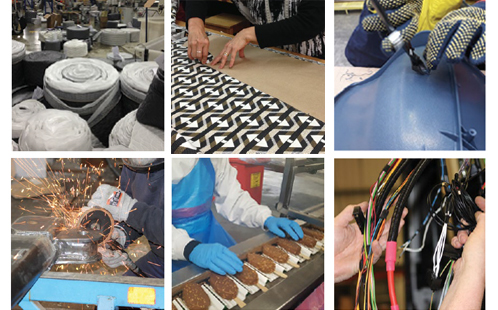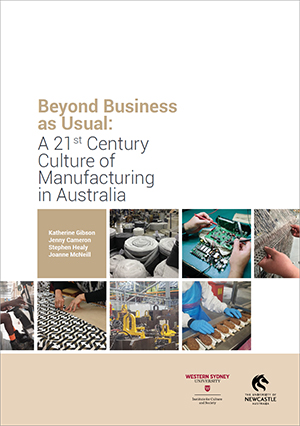
New research by Western Sydney University and the University of Newcastle has identified examples of a just and sustainable culture of manufacturing in Australia, and calls for policy changes to safeguard the sector’s future.
 Funded by the Australian Research Council, the Reconfiguring the Enterprise: Shifting Manufacturing Culture in Australia project examined what kind of future exists for Australian manufacturing and how it can address challenges of growing inequality, social exclusion and environmental degradation.
Funded by the Australian Research Council, the Reconfiguring the Enterprise: Shifting Manufacturing Culture in Australia project examined what kind of future exists for Australian manufacturing and how it can address challenges of growing inequality, social exclusion and environmental degradation.
The findings (PDF, 5.68KB) are the result of three years of in-depth research with ten manufacturers in NSW who are committed to responsible manufacturing of products including blueberries and packaging, carpet tiles, dairy products, electronics repair and refurbishment, fabricated metal, fashion, furniture, mattresses and mattress recycling, and meat.
Lead researcher Professor Katherine Gibson from Western Sydney University’s Institute for Culture and Society, says that manufacturing in Australia must move ‘beyond business as usual’ to overcome current and future challenges.
‘Our research has found convincing evidence that a successful future is possible for Australian manufacturing when shaped by a culture that maintains a firm’s viability while providing decent jobs in an inclusive society, and producing with a smaller ecological footprint.
‘This manufacturing culture is making a vital contribution to Australia but it is not well-known or publicly visible,’ she says. ‘Policy must change to strengthen and support this just and sustainable approach.’
Recommendations for policy include:
- Increase the profile of just and sustainable manufacturers through education and certification programs.
- Provide employment opportunities for people from diverse backgrounds through the development of partnerships with social enterprises and organisations who support them.
- Encourage the creation of high-quality, durable and environmentally-responsible products through customer education and the development of guidelines, standards and full cost accounting methods for product design and production processes.
- Undertake research and development into technologies for waste recycling or reuse and incorporate new technologies to facilitate the tracking of products throughout their lifecycle.
- Develop incentives for voluntary and industry-led stewardship schemes and introduce levies on products to cover the cost of responsible waste management at end of life.
Professor Gibson says it is more important than ever to support manufacturers with commitment, integrity, problem-solving capabilities and future orientation.
‘Australian manufacturing is at a crossroads and many question its relevance to the economy, but our research with innovative NSW-based manufacturing firms shows that a positive change is already underway, and that Australian manufacturing can adapt to and be successful in the 21st Century.’
Report launch event
The Beyond Business as Usual: A New Culture of Manufacturing in Australia report (PDF, 5.68KB) by Professor Katherine Gibson, Conjoint Associate Professor Jenny Cameron, Dr Stephen Healy and Dr Joanne McNeill, will be launched on Thursday 23 January at Western Sydney University’s Parramatta South campus by Senator for NSW, Dr Mehreen Faruqi (The Australian Greens Industry Spokesperson).
The launch will include a discussion with Senator for SA, Rex Patrick (Centre Alliance), Federal Member for Parramatta, Ms Julie Owens MP (Australian Labor Party), and NSW Member for Coffs Harbour, Mr Gurmesh Singh MP (The Nationals) followed by panel discussions with representatives of the manufacturing enterprises involved in the study.








